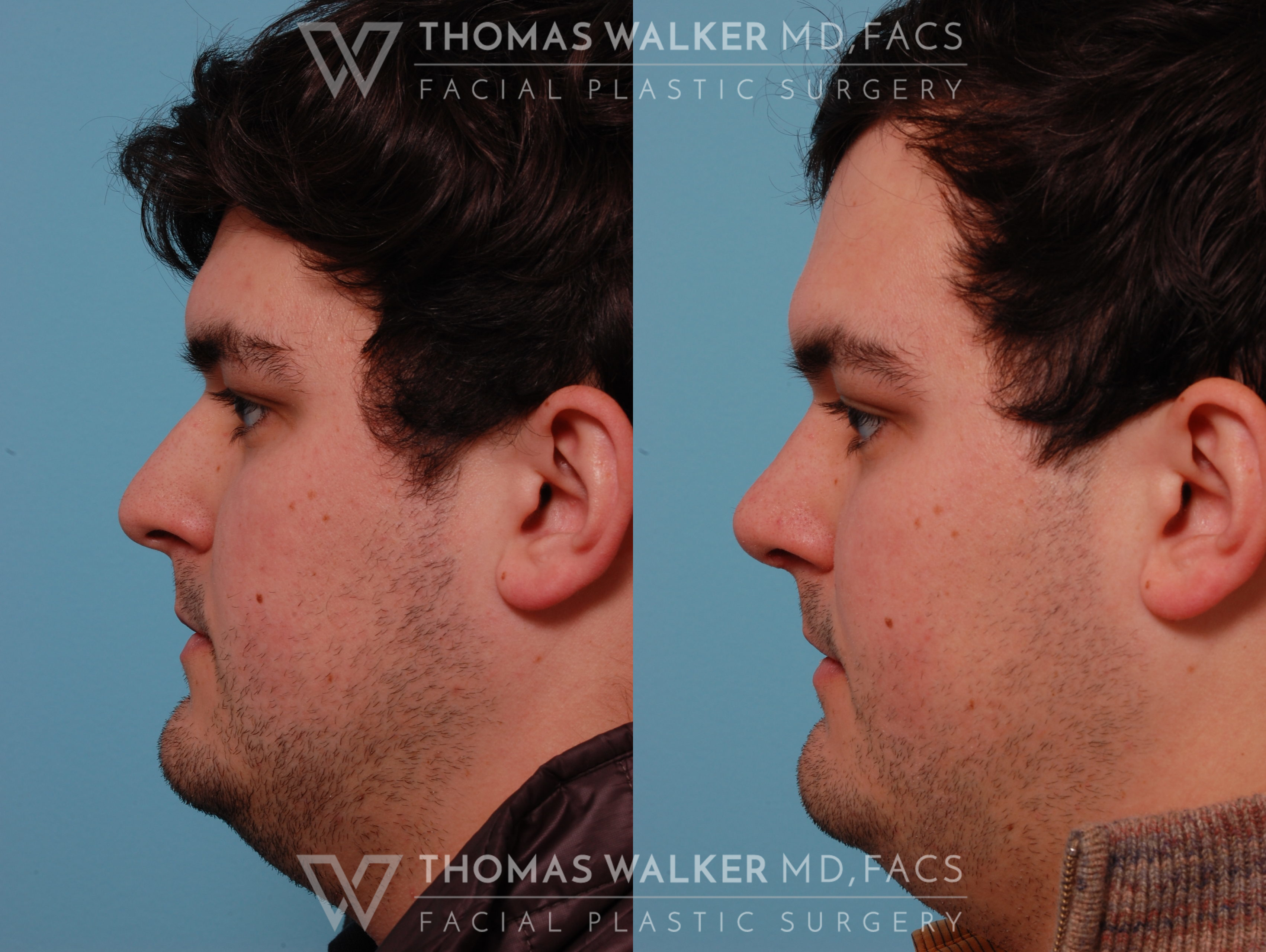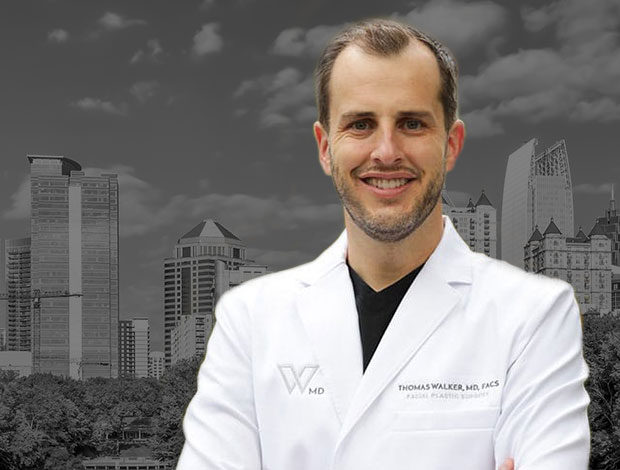
Sinus Surgery
Sinus surgery is a procedure that aims to open the sinuses inside the nose to clear blockages. This is an option for people with ongoing and recurrent sinus infections despite maximal medical treatment, for people with abnormal sinus structure, or abnormal growths in the sinonasal cavities. When you have constant or recurrent sinus or facial pressure, this may be an option for you to help open up your sinuses. If you are tired of persistent pressure headaches and recurrent or chronic sinus infections, sinus surgery may be the answer to your problems. Double board-certified facial plastic surgeon Dr. Thomas Walker is highly skilled in performing nasal and sinus surgery to improve your nasal breathing and diminish the pressure headaches you experience. Our office is conveniently located 19 minutes from Downtown Atlanta and 16 minutes from Buckhead.
What is Endoscopic Sinus Surgery?
Sinus surgery is performed nowadays using a small camera (endoscope) to visualize the nasal cavity and sinuses that are opened during such operation. This generally eliminates the need for an external incision. The endoscope allows for better visualization of diseased or problem areas. This endoscopic view, along with detailed imaging studies, may reveal a problem that was not evident before. During endoscopic sinus surgery, the focus is on treating the underlying cause of the problem. The ethmoid areas are frequently opened, which allows for visualization of the maxillary, frontal, and sphenoid sinuses. The sinuses can then be viewed directly, and diseased or obstructive tissue removed if necessary. There is often less removal of normal tissue, and the sinus surgery can typically be performed on an outpatient basis.
Many individuals choose to undergo this procedure when they are having issues breathing due to sinus problems.
-
Who is a Good Candidate for Sinus Surgery?
Individuals who experience the following may be a good candidate for sinus surgery:
- Sinusitis: Occurs when there is swelling in the nasal passages or sinuses. You may have also heard of it referred to as a sinus infection. Common symptoms of sinusitis include a stuffy nose, runny nose, pressure around the eyes, forehead, or nose, thick nasal drainage, and diminished smell.
- Nasal Polyps: These are swellings of the nasal lining secondary to inflammation. They can be different sizes and are usually the shape of a teardrop. Clusters or large polyps may make it difficult to breathe and can block the sinuses resulting in infection. Common symptoms of nasal polyps include difficulty breathing, a runny nose, reoccurring sinus infections, and a reduced sense of smell.
- Other Issues: Some individuals may be suffering from other forms of infections, blockages, CSF leaks, amongst other problems for which sinus surgery may be indicated.
Overall, the best way to determine if sinus surgery is right for you is through a consultation appointment with Dr. Walker. During your visit, you will talk about your medical history, the symptoms you are experiencing, and have a thorough physical examination performed including nasal endoscopy. Dr. Walker will determine if you have truly exhausted non-surgical treatment options and if this surgery can help improve your issues. Sinus surgery also helps improve nasal breathing. Endoscopic sinus surgery is generally intended for people with chronic sinus problems who do not respond to medical therapy. The diagnosis of chronic sinusitis must be based on a physical exam, as other problems can cause symptoms similar to those found with sinus disease. The majority of people with sinusitis do not require surgery. Their sinus symptoms can usually be successfully treated medically, including antibiotic therapy and other medications, treatment of allergy, and environmental control. However, in some people, surgical intervention is recommended as a sinus treatment. This may be because an infected or inflamed area does not clear with antibiotic therapy or other medications, the symptoms keep returning when antibiotics are stopped, or for other reasons. You should discuss the need for sinus surgery with Dr. Walker.
-
How is Sinus Surgery Done?
While there are many different types of sinus surgery, the most common type is endoscopic sinus surgery. This procedure is performed outpatient under general anesthesia. Dr. Walker will use a thin camera rod called an endoscope to allow him to fully see the nasal cavity and sinus tissues. He will then use specialized tools and instruments to safely open your sinuses and remove the causes of your sinus issues, whether it be a blockage, nasal polyps, scar tissue, or a growth inside your nose. This procedure does not involve any visible external incisions and is performed entirely through your nostrils with no cosmetic changes externally.
Sinus Surgery Recovery
After your sinus surgery is completed, nasal packing is typically not placed by Dr. Walker. You will be in the recovery room for approximately two hours before you can go home with a responsible adult family member or friend. You may feel as if you have a head cold. This is normal and will last for several days. Cold compresses and head elevation can help with swelling. Any discomfort that occurs can be controlled with prescribed pain medication. Many patients are able to return to work and school after one week, though this will vary depending on your type of job and recovery as some surgeries are more involved than others. Most people will feel up to returning to their daily routine after 1-2 weeks. Some bloody postnasal discharge may occur for approximately two weeks after this procedure. This is normal and slowly improves. You should not blow your nose for at least four to seven days following sinus surgery. As normal sinus drainage becomes reestablished, you may blow out some thick bloody mucus. This is completely normal. Follow-up visits are usually arranged at approximately one week and one month after surgery to clean crusts from the nose. Further follow-up visits are arranged at regular intervals until the area is healed. During follow-up visits, any persistent inflammation or scar tissue will be removed under local anesthesia. Careful post-operative care is essential to the success of this surgery. You will be provided with detailed post-operative instructions addressing post-operative care details. It is very important that you follow these instructions, as well as any additional instructions given by us, to promote healing and decrease the chance of complications.
Will Endoscopic Sinus Surgery Cure my Sinus Problems?
As with all sinus surgery, it is possible that the disease may not be cured by the operation, or that disease may recur at a later time. If this should happen, subsequent surgical therapy may be required. It should be realized that some medical therapy is usually continued after surgery, especially if allergy or polyps play a role in the sinus disease. This is necessary to prevent recurrence of disease. Overall, the majority of patients have had significant improvement with the combination of surgery and continued medical management. We will certainly work with you to attain this goal.
Schedule Your Consultation
If you would like to learn more about sinus surgery in Atlanta, contact our office today to schedule a consultation appointment with Dr. Walker. He will work with you to determine the cause for your breathing and sinus issues, and create a treatment plan to help you feel your best!



